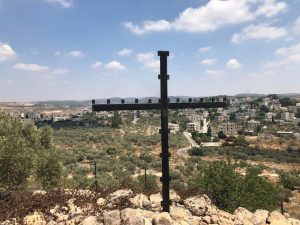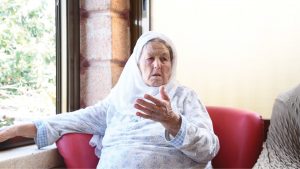Neighbors of trees and stone,” is how the 98-year-old Hajja Fatima from the village of Aboud describes the life of love and companionship between Muslims and Christians in the village. This ancient Roman village, located northwest of the city of Ramallah, also known as the City of Flowers, enjoys beautiful mountains planted with olive trees. Aboud’s historical heritage is no less important than its rich and natural heritage. In Aboud, there are several churches, monasteries, and mosques built on foundations dating from the Byzantine, Ottoman, and Crusader periods. The oldest church in the village is the Church of Our Lady, built on the foundations of a church dating back to the fifth century AD.
The village also embodies the Palestinian social fabric, which combines harmony and coexistence between its Muslim and Christian inhabitants. Events and stories passed on from one generation to another attest to this harmony and to the durability and solidity of this cross-religion relationship.

“To this day, Muslims and Christians share together their weddings, celebrations, and joy. We all go to the church and watch the young generation sing folkloric songs and dance the traditional dabke,” says Hajja Fatima. In cases of illness, it is customary for the people of the village to make a vow to Saint Barbara to intercede for them and heal their sick. “When my son Hussein fell ill, I vowed to light candles in the shrine of the Church of Saint Barbara where I prayed until he was cured.”
“We are a family,” said 60-year-old Fadia, Fatima’s neighbor, about their Muslim-Christian relationships. “We’re in fact an example of all the families in the village. The term ‘cousin’ is frequently heard in the village of Aboud, particularly when it refers to two people who have breastfed from the same woman, even if one is Muslim and the other Christian.” Fadia adds: “It is common in the village to breastfeed each other’s children, whether Christian or Muslim. When I gave birth to my child Mayada, I fell ill and was forced to stay in hospital for about a week. My Muslim neighbor breastfed Mayada and took care of my daughter throughout that period.”
During the holy month of Ramadan, all the villagers participate in organizing iftars. It is customary for Christian families to prepare a Ramadan breakfast for their Muslim neighbors. “Christians sometimes fast during this holy month as a kind of fulfilment of their vows,” says Fadia.

During the war, the villagers in Aboud prayed together and asked the Virgin Mary to protect them. Fadia recounted the story of the Ballas family, a Muslim family who gave olive oil to the church every year until the mother of the family passed away.
These vivid examples of daily life in Aboud illustrate how national unity is embodied in Palestinian society. Let the world know that the land on which Jesus was born is a land of peace and love.


